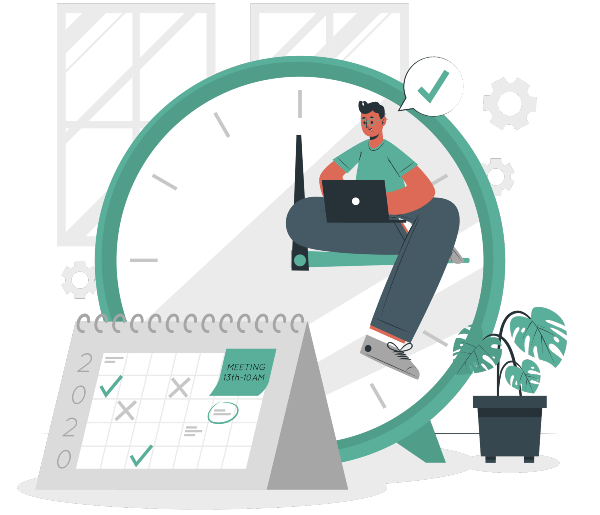William Penn: "Time is what we want most, but what we use worst."
Time Management Definition: The predictable control an individual can exercise over a series of events.
Time flies... even when you worry about wasting time, you still waste time 🙂 It's not for nothing that they say that time is the most important source of stress. So if you are interested in how to work efficiently, how to succeed in everything, and fulfill everything you set out to do daily, read this article in its entirety!

By reading this article you will learn some practical tips for:
- You manage your work well and use your time constructively.
- It improves your productivity/efficiency so you spend time on activities that produce results.
Let's start by understanding the problem: why do people usually waste time?
- They have poor planning - they don't know how to build a realistic agenda.
- Procrastination - wasting time on unimportant tasks.
- Wasting time on waiting / delays - we also live in a society that depends on the delays and lack of organization of others.
- Working with papers - bureaucracy eats up time.
- On spam: long comments and multi-line emails take time.
- Visitors/unexpected tasks/unexpected - people and situations that throw your schedule upside down.
- Failure to respect priorities/lack of them - the inability to establish some real priorities.
- Phone interruptions - just when you've managed to fully concentrate on what you have to do... the phone rings!
- Ineffective delegation - we believe that only we can do things well.
- Extended lunches or breaks - the lingering cigarette talks.
- Cluttered workspace - an untidy space is cluttered.
- Inefficient/Extended Meetings - meetings without structure and an agenda set ahead of time can drive you crazy.
- Socializing at work - discussions between colleagues can be interesting, but very annoying when you have a complicated report to complete.
- Wrong/incomplete information received - wading through numbers and incomplete data is torture
How many points did you find yourself at? Certainly many are not foreign to you and maybe some even irritate you, but you still haven't managed to solve anything so far. Why?
The answer to this dilemma comes from honestly answering a key question: What are your demands on your life/time?
It all starts with goals and objectives. Write down your career goals, your overall life goals, and especially the goals you have for your current job. Keep them somewhere easy to refer to (perhaps monthly). It's also a good idea to update them as you change your job/life.
Pencil in and template your goal setting. A suggestion to help you have them handy anywhere and anytime is to keep them in a file in the cloud.
So how do you use your time effectively?
- Tackle the most important and difficult tasks first. It may be counter-intuitive and requires a lot of strength of character on your part. But it's the right way to be effective in the workplace. It is much more productive to check off 3 important and difficult things than 20 tasks that could be delegated.
- Here we come to delegation, delegate intelligently and generously. Help others develop by delegating responsibly and with sufficient detail. Empower the given person (subordinate or colleague) with confidence and authority.
- Avoid the crowded office syndrome.
- Cut back on time spent in meetings.
- Plan.
- Learn to say "No".
- Consolidate efforts related to similar tasks.
- Use lists.
It's in WORD (because you can easily change its structure), it's organized by days and hours, and each day has 3 lists:
- Day of the week, date – you can return to them by simple search on the computer;
- Tasks where you depend on others - this is how you request information on time/control teamwork;
- Tasks in which you only monitor - this is how you control your team that you would subordinate.
Desktop/mobile apps that help you focus on what you need to do:
They allow you to block distracting websites and apps for set periods/or stay focused on what you need to do:
The easiest way to track your time is to use an extension like RescueTime to automatically track the time you spend on each site.
Scheduling and setting up meetings in the virtual environment is another way to save valuable time, because online meetings = efficiency.
How to organize and run successful online meetings?
- It should be known in advance what is being discussed - the agenda should be agreed upon by everyone (you can set the duration of the meeting to 30 minutes and assign 10 minutes to each of the items on the agenda).
- Don't invite filler colleagues (calculate the hourly salary of each meeting participant!)
- Choose a meeting moderator.
- End with a clear to-do list.
- Someone must take the minutes of the meeting.
- The 5-minute rule - to those employees who are not concise in their presentation, announce very clearly that they only have five minutes.

Tips for time management when working remotely:
- Centralize control (Slack offers good opportunities for this).
- Remote task management through a computer program that allows managers to monitor the tasks delegated to all members of an activity sector is better than offline reporting.
- Set clear game rules.
Time management tips when dealing with difficult clients/employees:
- Leading to the door of uninvited guests or those who "eat up time" with insignificant details, lingering.
- Avoiding promises that have a high chance of not being honored.
- Using email to keep in touch with chatters.
- Setting up meetings at the end of the program/
- Avoiding people who take up a lot of time.
Useful books and some main ideas taken from them:
- „Deep Work” by Cal Newport:
- Decide where you will work and how much.
- Rest can be an oasis of inspiration.
- Make peace with boredom “To be able to work deeply, you need to 'rewire' your brain to feel comfortable resisting distracting stimuli. (see: Facebook).
- Treat superficial things with suspicion, as their damage is often greatly underestimated.
2. „Eat that Frog” by Brain Tracy:
- Start with the hardest task, strategically break it down into chunks, and conscientiously complete each chunk.
Conclusions:
- 1 minute spent planning activities = 4 minutes gained when putting that activity into practice.
- As a manager, apply the 60-40 rule: plan only 60% of the time and leave the remaining 40% for surprise events.
- Reward your victories.

